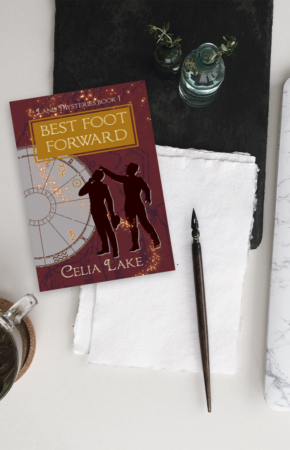Welcome to today’s Idea To Book post, this time about Best Foot Forward. This is the book that honestly has the best origin story. Kiya – my friend and editor – left a comment in Eclipse in February 2021 when we were editing it. It said:
I now sort of want the buddy cop story in which Alexander and Carillon team up to utterly destroy a munitions smuggler.
I left it in the Google Doc when I sent it to my early readers, and every single one of them left comments thoroughly wanting this. My early readers are smart people and they have good ideas, so I started staring at it. I stared at it for over a year, honestly.
At the time, I hadn’t intended to write past 1929 for a variety of reasons.
I wasn’t sure how to handle a number of the complicated pieces of history (some of which get very close to my own family’s history, as I’ll mention below). And yet, the idea was absolutely compelling. I’m so glad I did – and that I figured out a whole series arc for the Land Mysteries books. The final book, set in 1946-1947, comes out in May. That’s The Magic of Four.
Best Foot Forward deals with the shifts that happen in Europe as the world heads toward war again, and it’s also about dealing with at least a little of the trauma and loss of the Great War, even if it’s been decades. Read on for more of the details.

Alexander and Carillon
Both Alexander and Carillon appear in previous books. Carillon had, at this point, appeared in Goblin Fruit and On The Bias. In the former, he explicitly notes that he is bi, though it is his romance with Lizzie, and so the focus is on her. (And he’s also, at that stage in his life, aware of the need to marry and do his best to have a heir or two.)
Ancient Trust
Just before I wrote Best Foot Forward, I sat down to write a prequel novella, Ancient Trust, which is about Carillon inheriting his title and trying to figure out what happened. (You can get it by signing up for my newsletter, joining me on Patreon at any level, or joining the Albion’s Delight Discord. More info at the Ancient Trust link about the novella and how to get it in those places.)
Ancient Trust is not a romance – it alternates between Carillon and Benton’s points of view, before either of their romances with other people – but it does get deep into Carillon’s head. It also opens with him waking up, knowing that his male partner for the night had slipped out before he woke up. Carillon is – as noted late in the book – absolutely a hedonist, though he prefers honest country pleasures to purely decadent luxuries most of the time.
About Alexander
Alexander is a secondary character in Eclipse, a member of the Council who’s been away from Albion for years, who has returned to recover from a nasty curse and teach at Schola. His relationship with Isembard – his former mentee, comrade in arms, and fellow mourner of Perry Judson – is tremendously complex, though they do work out how to be adult colleagues and friends in the course of that book. I knew that Alexander was aromantic and asexual, that he’d never remotely been associated with anyone even in gossip.
And of course, Carillon has absolutely no reason to trust anyone on the Council. Only Alexander has the skill he desperately needs, and Carillon will do a great deal to get his friend and former lover out of an increasingly horrible situation. It’s one that’s dangerous not only to his friend, but to everyone who might be on the wrong end of what he invents.
The writing process
Getting to write both Alexander and Carillon was an absolute challenge and an absolute joy. I wrote the main book in a flurry – 36 days of writing, not entirely consecutive (I took a couple of days in the middle to finish a few chapters for a different book in editing.) Then there was the epilogue novella, a series of scenes that sketch out how they go on together.
It’s the first book – and so far the only – where I had multiple three chapter nights. Normally, I consider a chapter a great day, and I sometimes do a double. Here, though, those three chapter sequences made a lot of sense. Two of them are the climactic points for each character – a chapter to set up the crisis, the crisis, and the aftermath. Writing them all in a tumbling flow worked very well here. Even if I did end up ignoring a lot else in my life besides the basic necessities (and my day job) to make that happen.
Music
I’ve also said this one before, and there’s a longer post about the music mentioned in this book, so I’m not going to repeat the details. But this is the book that gave me classical music – specifically Common Practice Period music in Europe – back. I’d had a horrible experience with a class at the very end of my college years that made much of it very difficult to listen to.
These two men, with their overlapping loves for the arts and their different preferences and chosen references, pulled me back to that. Part of that was the history – once I realised I could figure out what concerts they actually went to, the researcher in me had to figure that out. That was even more true given that very famous concert in Berlin.
For all those reasons, this book is particularly near and dear my heart.
Vienna
And finally, one note. I mentioned that family history, right? My mother was born in 1936 in Vienna and by the spring of 1938 she (and my grandparents and others in the family) were refugees in Northern Ireland. A bit more than a decade ago, I had a chance to go on a trip with her, including Vienna, and we were able to walk down the street where my grandparents had a flat, see the cafe where my grandmother would go (they’d recently refurbished back to the 1930s, all gleaming chrome and tile and amazing pastries and coffee).
And I got to go and see the Prater, including the amazing Ferris wheel.
As soon as I realised I wanted to have a scene where they tried things out before going to Berlin and the heart of the story, I knew it had to be in Vienna. The chance to stick Alexander and Carillon in a carriage of the wheel by themselves for a rotation or three was just too good to miss. But I also wrote knowing that they might have overlapped with my grandparents or great-grandparents at a concert, or a bookstore, or even an art dealer (though my family tended to books and music over art).
Does this intrigue?
If it does, here’s where to get here’s where to get Best Foot Forward. Besides the other related books I’ve mentioned above, Alexander has a novella focused on him (and his trip to America in 1938) in Nocturnal Quarry (book two of the Land Mysteries series), and both Alexander and Geoffrey are point of view characters in Upon A Summer’s Day.
There’s also an extended series of extras for Best Foot Forward (about 35k words total), Interstitial Moments sharing some thoughts from various other perspectives.
